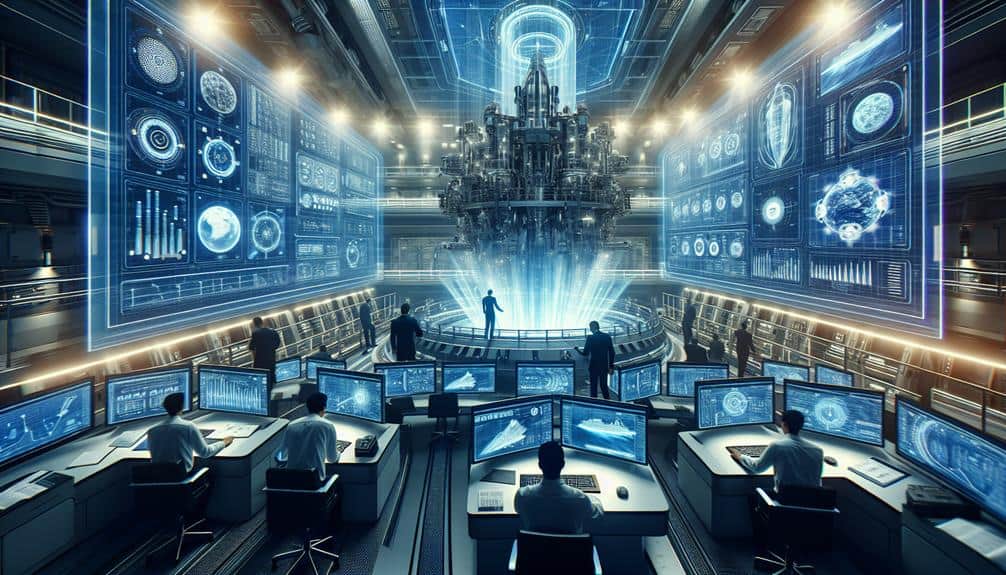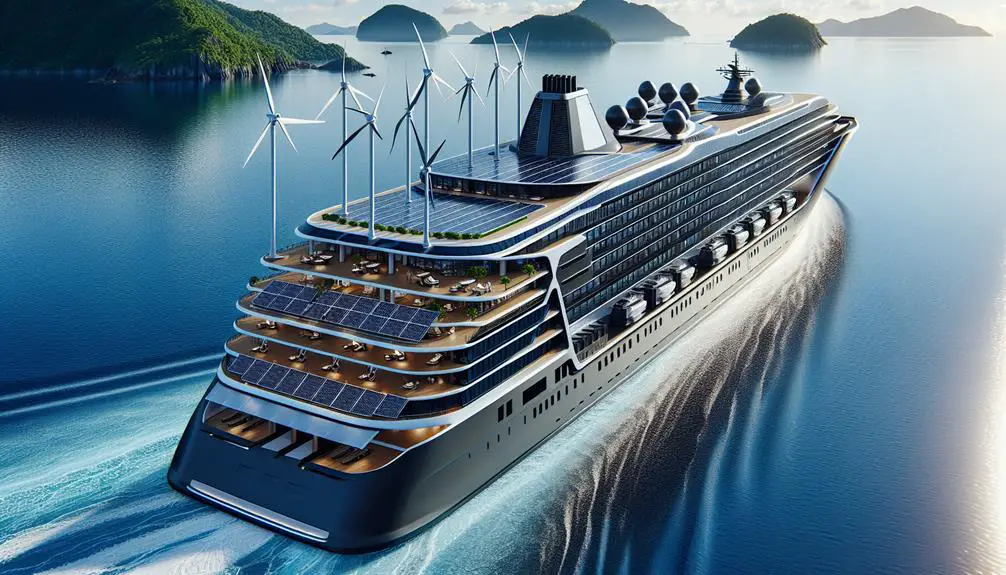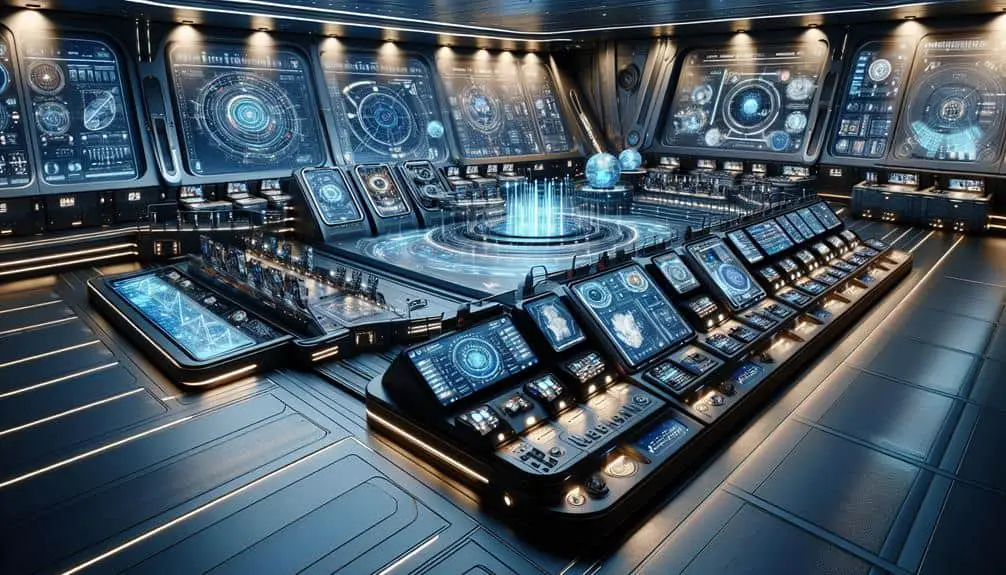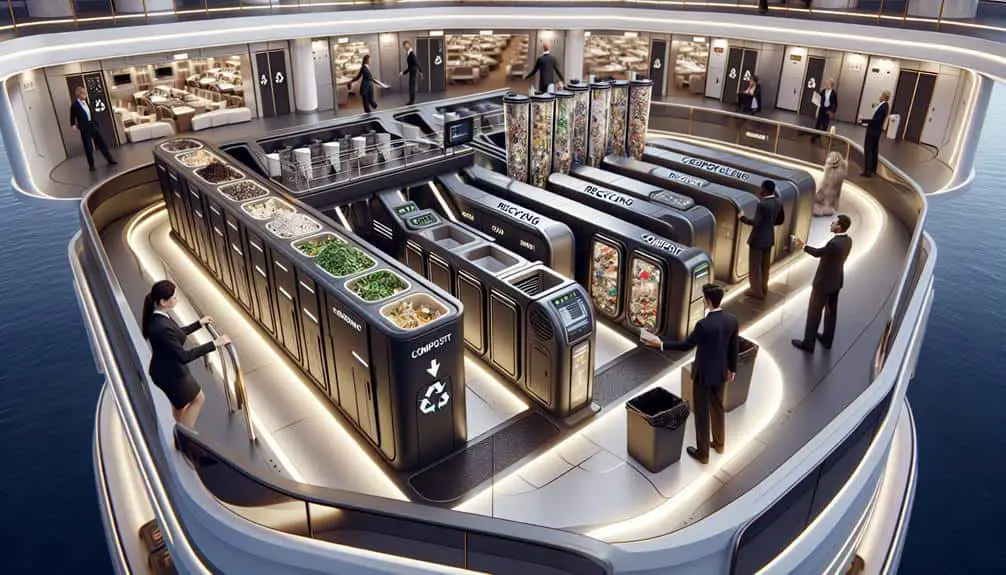Revolutionize your cruise ship propulsion by maximizing fuel efficiency through combustion optimization. Integrate electric propulsion for energy efficiency and utilize LNG for cleaner emissions. Implement advanced hull designs to reduce drag and enhance performance with materials like carbon fiber composites. Optimize propellers for fuel savings and performance by focusing on blade design and pitch control. These five essential tips are vital for elevating your ship's sustainability and efficiency to new heights.
Key Points
- Utilize advanced hull designs for efficiency and reduced drag.
- Optimize propellers for enhanced performance and fuel savings.
- Integrate electric propulsion systems for energy optimization.
- Embrace LNG power to lower emissions and improve sustainability.
- Maximize fuel efficiency by analyzing and optimizing combustion processes.
Efficient Fuel Consumption Strategies
To maximize fuel efficiency in cruise ship propulsion systems, engineers meticulously analyze and optimize the combustion process. One key strategy to enhance engine efficiency is the utilization of alternative fuels. By incorporating alternative fuels such as liquefied natural gas (LNG) or biofuels, cruise ships can reduce their environmental impact while improving their overall performance. These alternative fuels burn cleaner than traditional marine diesel, resulting in lower emissions of harmful pollutants.
Engine efficiency is essential in achieving the best fuel consumption. Engineers focus on enhancing the combustion process within the engines to extract the maximum amount of energy from the fuel. This process involves fine-tuning the fuel-air mixture, optimizing ignition timing, and ensuring proper engine temperature control. By fine-tuning these parameters, cruise ships can operate more efficiently, requiring less fuel to cover the same distance.
Integration of Electric Propulsion Systems
The integration of electric propulsion systems in cruise ships represents a key advancement in enhancing efficiency and reducing environmental impact. Electric propulsion systems utilize power management techniques to optimize energy usage, leading to greater efficiency compared to traditional propulsion methods. One key element driving this efficiency is advancements in battery technology. Modern cruise ships equipped with electric propulsion systems often rely on high-capacity batteries that can store and deliver power efficiently, allowing for smoother operation and reduced emissions.
Effective power management is essential in electric propulsion systems to guarantee seamless operation while maximizing energy efficiency. Cruise ships with integrated electric propulsion systems utilize sophisticated power management systems to regulate energy flow between the batteries and propulsion units efficiently. These systems help in balancing power demands, optimizing energy usage, and enhancing overall performance.
Furthermore, advancements in battery technology have played a significant role in the success of electric propulsion systems in cruise ships. Improved battery capacity, longevity, and charging capabilities play a crucial role in ensuring the reliability and sustainability of electric propulsion systems on these vessels. By leveraging these technological innovations, cruise ships can achieve higher levels of efficiency and lower environmental impact, ushering in a new era of propulsion technology in the maritime industry.
Advantages of LNG Power
Advancing beyond electric propulsion systems, a notable shift towards utilizing LNG power in cruise ships presents notable advantages in terms of efficiency and environmental sustainability. LNG, or liquefied natural gas, is a clean energy source that offers lower emissions compared to traditional marine fuels. When used as a fuel for cruise ship engines, LNG reduces sulfur oxide emissions to almost zero, minimizing air pollution and contributing to better air quality in port cities. Additionally, LNG combustion produces notably lower nitrogen oxide and particulate matter emissions, further enhancing its environmental benefits.
In terms of efficiency, LNG power provides a more stable and reliable energy source for cruise ships, leading to smoother operations and increased fuel efficiency. The use of LNG also results in quieter engine operations, reducing noise pollution in marine environments. By embracing LNG power, cruise ships can align with stricter environmental regulations while enhancing their overall performance and sustainability.
Utilizing Advanced Hull Designs
Embrace the cutting-edge technology of advanced hull designs to revolutionize cruise ship propulsion systems and enhance efficiency and performance. When it comes to hydrodynamic performance, innovative materials play an important role in shaping the future of cruise ships. Utilizing advanced hull designs involves incorporating features such as bulbous bows, streamlined hull shapes, and optimized appendages to reduce drag and improve overall propulsion efficiency.
Innovative materials like carbon fiber composites and special coatings are being used to construct hulls that offer better weight-to-strength ratios, resulting in lighter vessels that require less fuel to operate. These materials also contribute to reducing maintenance costs and increasing durability against harsh marine environments.
Furthermore, advanced hull designs are optimized through computational fluid dynamics simulations, allowing naval architects to fine-tune the shape of the hull for maximum performance. By carefully considering factors such as resistance, wave patterns, and propulsion system integration, cruise ships can achieve higher speeds and lower fuel consumption, ultimately leading to a more sustainable and cost-effective operation.
Importance of Propeller Optimization
With a focus on efficiency and performance enhancement, optimizing propellers plays a pivotal role in revolutionizing cruise ship propulsion systems. To achieve the best results, meticulous attention to blade design and pitch control is paramount. Here are key aspects to take into account:
- Blade Design: The shape, material, and number of blades play a crucial role in propulsion efficiency. Advanced designs like skewed blades or those with adjustable pitch angles can enhance overall performance.
- Pitch Control: The ability to adjust the angle of the propeller blades while in operation allows for the best thrust generation across different speeds and operating conditions.
- Efficiency Gains: Proper propeller optimization can lead to substantial fuel savings, reduced emissions, and increased overall operational efficiency for the vessel.
- Hydrodynamic Performance: Fine-tuning the propeller to match the vessel's hull characteristics ensures minimal resistance and maximum thrust output, translating to smoother sailing and improved speed capabilities.
Frequently Asked Questions
Are There Any Potential Drawbacks or Limitations to Using LNG Power for Cruise Ship Propulsion?
When considering LNG power for cruise ship propulsion, drawbacks and limitations exist. Drawbacks may include the need for specialized infrastructure and potential safety concerns. Limitations may arise from fluctuating LNG prices impacting cost efficiency and environmental impact considerations.
How Do Electric Propulsion Systems Impact the Overall Performance and Maneuverability of a Cruise Ship?
When it comes to electric propulsion systems on a cruise ship, you'll find a significant enhancement in maneuverability due to precise control. The benefits include smoother operation, improved efficiency, and reduced environmental impact.
What Are Some Innovative Technologies Being Developed to Improve Fuel Efficiency in Cruise Ship Propulsion Systems?
To enhance fuel efficiency in cruise ship propulsion systems, innovative technologies like hybrid solutions and solar integration are being developed. These advancements optimize energy usage, reduce emissions, and improve sustainability in marine transportation.
How Do Advanced Hull Designs Contribute to Reducing Emissions and Improving Sustainability in Cruise Ship Operations?
To enhance sustainability in cruise ship operations, advanced hull designs play a vital role. By optimizing hull efficiency, emissions can be reduced markedly. This results in a more environmentally friendly approach, ensuring sustainable operations for the future.
Can Propeller Optimization Also Help in Reducing Noise Pollution From Cruise Ships?
Propeller optimization plays a vital role in reducing noise pollution from cruise ships, benefiting both the environment and passenger experience. By fine-tuning propeller designs, noise levels can be minimized, lessening the vessel's environmental impact.




